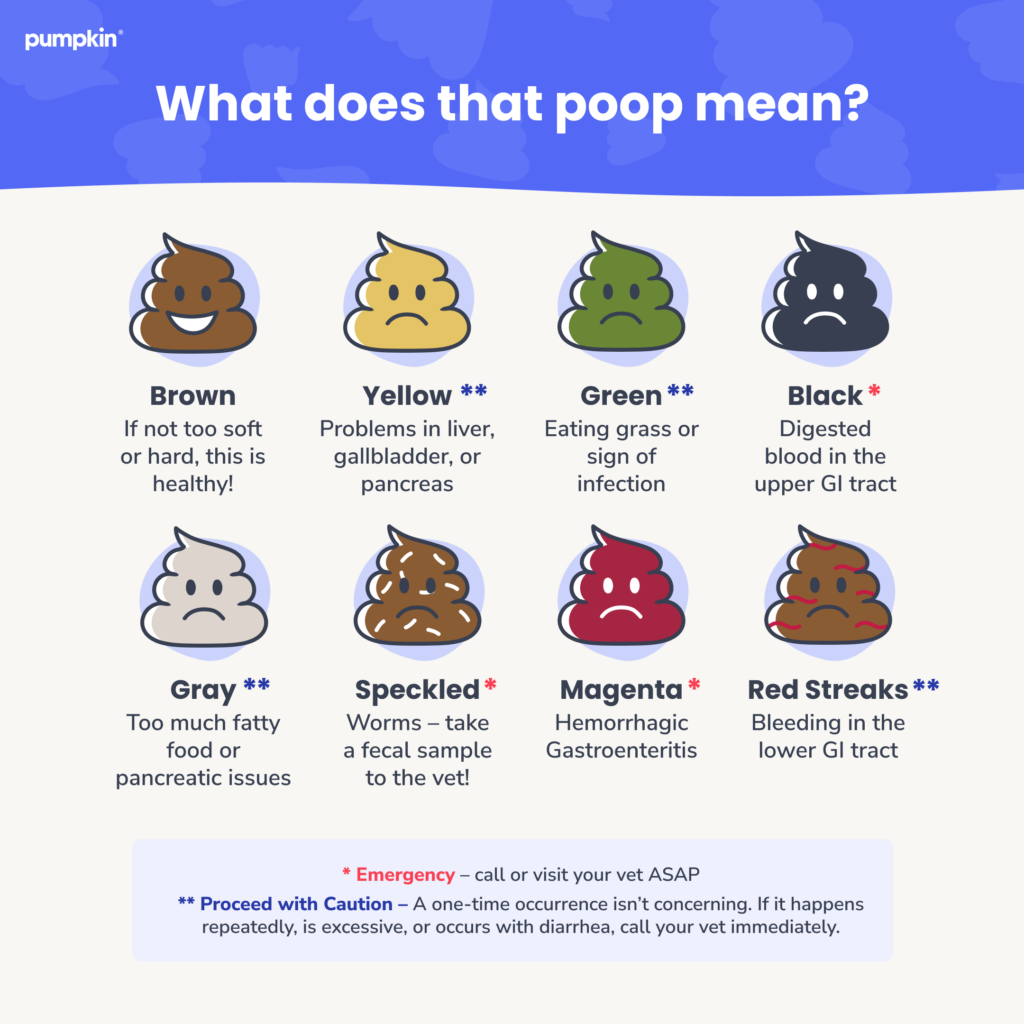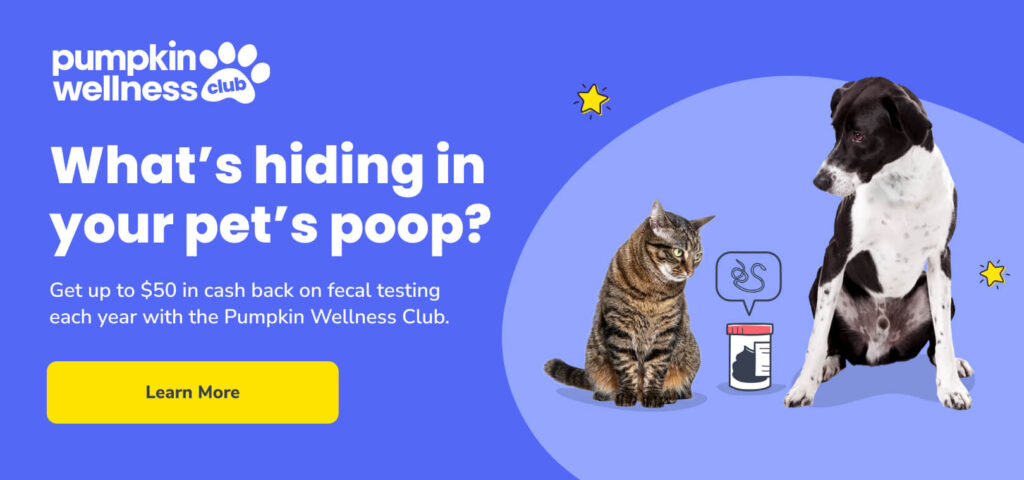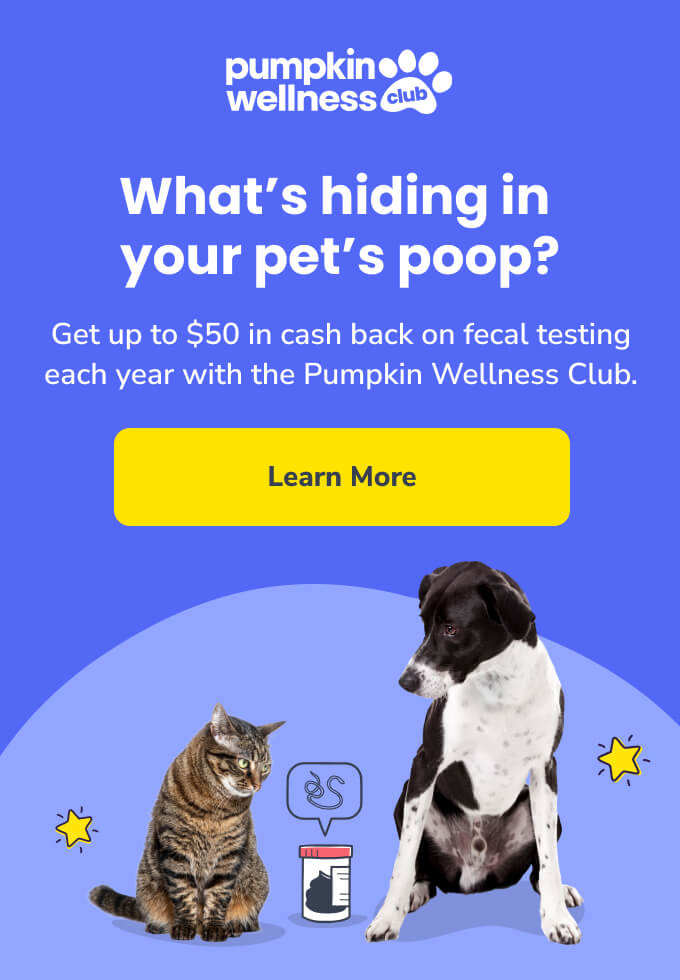Key Points:
- A simple poop sample can reveal a world of information about your pet’s health.
- Regular fecal testing helps protect both your pet and your family from parasites and other diseases.
- Join the Pumpkin Wellness Club* to get cash payments towards routine fecal screenings, blood tests, and other vital preventive care services.
Let’s talk poop. It’s not the most glamorous topic, we know, but it’s an incredibly important aspect of your pet’s health. Believe it or not, a simple sample of your furry friend’s fecal matter can reveal a lot about what’s going on inside their body.
A fecal analysis can reveal the presence of stomach-turning parasites like giardia, harmful bacteria in your pet’s gut, intestinal bleeding, or various worms that can hijack your pet’s nutrition. The Companion Animal Parasite Council recommends that every adult pet have fecal testing at least twice a year — and even more frequently for puppies and kittens.
Even if your pet seems healthy, your veterinarian will ask you for a sample of your dog or cat’s stool at their annual or twice-yearly wellness checkups. They’ll also inquire about the appearance of your pet’s poop, so take notes on any abnormally soft, mucousy, or colorful stools as you’re cleaning up after your pet.
Now that we’ve addressed the ick factor, let’s talk cost. The Pumpkin Wellness Club can help you get cash to use towards on your pet’s routine preventive care, including $50 in cash for your dog’s fecal testing each year, and $40 for your cat’s. Members also get access to special discounts on top pet brands and cash for other important preventive care services, like vaccinations and wellness checkups, bringing your potential yearly savings to up to $360 for dogs, and up to $390 for cats.
Get your pooper scoopers and baggies ready, because we’re about to dive even deeper into the litter box.
Why should you care about your pet’s poop?
Imagine your pet’s body as a complex factory. Food goes in one end, nutrients are extracted, and waste comes out the other. Fecal testing is like a quality control check on that factory. It helps us see if everything is running smoothly or if there are any interlopers causing problems.
Unwanted guests in your pet’s digestive tract may include various bacteria, worms, and single-celled parasites like giardia. These organisms can make your pet sick and hijack their nutrition — plus, other animals who come into contact with your pet’s poop can be easily infected (one of the reasons why cleaning up after your pet is so important).
Fecal testing, while not the most glamorous aspect of pet ownership, is a crucial diagnostic tool that can significantly impact your pet’s health and well-being. These tests are simple yet effective, and the veterinary care staff will do most of the dirty work. All you need to do is show up to your pet’s checkup with a fresh poop sample in tow.
What does fecal testing screen for?
Fecal testing serves as an early warning system for various health problems, including parasitic and bacterial infections. You might be surprised at the mini-zoo of tiny critters that can call your pet’s digestive system home.
Fecal testing can help identify a range of parasites that can colonize the digestive tract, including:
Roundworms: These look like spaghetti and can cause vomiting, diarrhea, and weight loss. They’re particularly dangerous for puppies and kittens.
Hookworms: These tiny parasites attach to the intestinal wall, sucking blood and causing anemia. Symptoms include bloody diarrhea, weight loss, and lethargy.
Whipworms: These whip-shaped parasites can cause chronic diarrhea and weight loss.
Giardia: A microscopic parasite that causes watery diarrhea, often with a foul odor. It can also lead to dehydration.
Coccidia: Another microscopic parasite that causes diarrhea, often with blood or mucus.
Beyond parasites, fecal tests can also help identify common bacteria and subtle signs of disease. A fecal analysis can reveal blood in the stool that’s not visible to the naked eye, which can be a sign of intestinal inflammation. Regular testing allows the veterinarian to get a head start on diagnosing and treating your pet, leading to better outcomes.
The veterinarian will also examine the consistency of your pet’s stool during their analysis. As a pet parent, you’re likely all too familiar with your fur baby’s daily movements, and you should tell the vet about any irregularities you observe at home. If your cat is spending extra time in the litter box or if your dog’s poop is unusually slimy, that’s an important part of the overall picture of digestive health.
What should my pet’s poop look like?

You should become familiar with the normal appearance of your pet’s poop (that is, if you aren’t already). Their feces should be chocolate brown in color and formed into firm pieces. If your dog’s poop is softer than normal when you pick it up, or if your cat’s litter box is strewn with loose poops, they might be feeling a little under the weather.
The most important warning sign to look out for is the presence of blood in your pet’s stool, which can indicate severe inflammation in the digestive tract. Other red flags include slimy or mucousy poop, too-soft stools, or bigger stools than usual. (Let’s just say your pup’s daily output should be about the same size as what they’re eating.)
If your pet’s poop looks abnormal, take your pet — along with a fresh stool sample — to your family veterinarian. They’ll perform a routine fecal analysis to screen for parasites and bacteria that could be causing gastrointestinal upset. Depending on what they find, the vet may call for follow-up testing to diagnose the problem.
When should you check your pet’s poop?
Most veterinarians recommend fecal testing at least once a year for all dogs and cats, even pets that live exclusively indoors. Young puppies or kittens should have more frequent fecal analyses (ideally four times in their first year) since they are especially vulnerable to parasitic infections.
While annual fecal exams are a good baseline for most pets, the Companion Animal Parasite Council — an organization that monitors ticks, heartworm, and intestinal parasites that can sicken your pet — calls for twice-annual fecal testing for adult pets, and four tests a year for puppies and kittens.
Other pet populations and situations that might call for more frequent fecal testing include:
- Pets with diarrhea or vomiting: Changes in bowel habits are often the first sign of a problem.
- Pets with weight loss or lethargy: These could be symptoms of a parasitic infection.
- Pets that spend time outdoors: Exposure to other animals increases the risk of parasites.
- Before boarding or grooming: Many facilities require proof of a negative fecal test.
- Before breeding or adopting out: Fecal testing is crucial to ensure the health of both the parent animals and offspring.
What happens during a fecal test?
Don’t worry, it’s not as gross as it sounds. All you need to do is collect a recent, fresh sample of your pet’s poop and bring it to your vet at your pet’s next checkup or annual visit.
Your vet will examine the sample under a microscope to look for any abnormalities and let you know what they find. Results of fecal analyses are typically available within hours to a few days.
How much does fecal testing cost?
The good news is that fecal testing is usually pretty affordable. The cost can range between $25 and $75, depending on where you live, your vet’s fees, and what they are testing for. The cost of a standard fecal analysis is often bundled in your pet’s annual wellness exam, making it even more convenient.
Members of the Pumpkin Wellness Club can get up to $50 in cash for fecal testing each year — and that’s just one of many preventive care paybacks. The club also offers $100 in cash for your pet’s annual checkup, plus funds for vaccinations and access to special discounts on top pet brands.
With a large portion of the cost covered and the mysteries of fecal testing solved, there’s really no reason not to bring your pet’s stool sample to your next vet visit. In the meantime, keep an eye on your pet’s poop to monitor for any irregularities. If your pet has specific symptoms or risk factors, your vet may recommend additional testing for an added cost.
Keeping your pet’s poop in check
Regular fecal testing is a simple, effective way to protect your pet’s health. By catching problems early, you can prevent serious illnesses and ensure your furry friend lives a long and happy life.
So, the next time you’re scooping the litter box or cleaning up after your dog, take a moment to appreciate that little pile of information. It could save your pet a lot of discomfort.
DISCLOSURE





